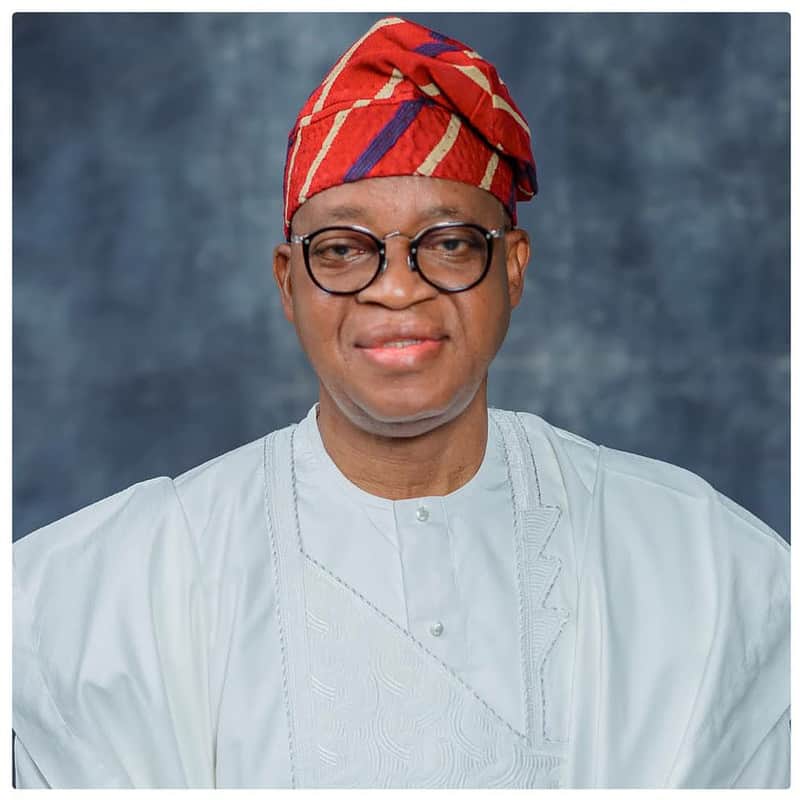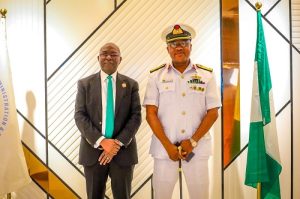Creation of Marine, Blue Economy Ministry Is Determination to Build Future of National Prosperity – Oyetola

OYETOLA

• As Akutah says NSC discussing with shipping service providers on competitive tariff to forestall diversion of cargoes to neighbouring countries
• Rolls out Shippers’ Council contributions to achieve FG agenda on marine, blue economy
By Francis Ugwoke
The Minister of Marine and Blue Economy, Hon. Adegboyega Oyetola, has said that the intention of the federal government in creating the Marine and Blue Economy Ministry is a commitment to building a future where the sector plays a major role in national prosperity.
This was as the Executive Secretary, Nigerian Shippers’ Council, Barr Pius Akutah, disclosed that the Council is currently engaging the providers of shipping services to ensure that they introduce competitive tariff that will forestall diversion of cargoes to neighbouring countries.
Oyetola explained that President Bola Tinubu’s vision to create the Ministry is a monumental step towards harnessing the vast untapped potentials of Nigeria’s maritime sector.
Speaking on the occasion of the seminar which theme is “Renewed Hope Agenda: The Place of Nigeria’s Maritime Industry”, held by the League of Maritime Editors and Publishers, the Minister said the President understands how much value the sector could to the national economy.
Represented by the Director Maritime Services, Mr Babatunde Sule, the Minister said the decision to create the Ministry was not only a demonstration of the President’s deep understanding of the economic possibilities of the sector , but also a clear indication of his political will to ensure that Nigeria claims its rightful place as a key maritime player globally.
He added, “the maritime industry has the potential to transform Nigeria’s economy, create jobs, and improve livelihoods. With our rich coastline and strategic location, the country is well positioned to become a key hub for maritime activities in Africa. The creation of this Ministry therefore reflects government’s commitment to building a future where the blue economy plays a major role in national prosperity.
“In bringing this vision to life, we are working to reposition the sector by improving port efficiency, enhancing infrastructure, boosting maritime security, and developing the workforce. Additionally, we aim to sustainably leverage maritime resources to create jobs, increase revenue and promote environmental stewardship”.
Oyetola added that to achieve these goals, the media remains a critical partner, being the Fourth Estate of the Realm.
“Your role in shaping public perception and highlighting critical issues is very essential. Throough your platforms, you can showcase the maritime sector’s potentials and its benefits to all Nigerians”, he said.
The Minister also urged the media to continue highlighting the opportunities in the maritime space by showcasing the successes and ensure that public and private stakeholders were held accountable.
“Your role in informing and educating the public will be key to unlocking the full potentials of the blue economy”, he said.
He commended the League of Maritime Editors for the efforts in bringing attention to the sectors challenges and opportunities, adding that these contributions have raised awareness of the blue economy’s vast possibilities.
In his speech, the Executive Secretary of Nigerian Shippers’ Council, Barr Pius Akutah, pointed out that the unbundling of the Ministry of Transportation into two was mainly for effective service delivery and expansion o revenue base of the country.
Akutah assured that his agency will continue to promote and advocate for full digitalization of port process and operations in Nigerian ports.
“ This is in line with the Federal Government’s “Renewed Hope” and also our mandate as the nation’s port economic regulator. I am happy to inform this gathering that over 90% of Nigerian port process and operations are now automated”, he said.
Akutah who was represented by one of the Directors in the agency, Mr. Rotimi Anifowoshe, noted that
trade between African countries has remained “more expensive compared with trading with other parts of the world”.
He attributed this to several bottlenecks, including “poor infrastructure, cumbersome border procedures, trade restriction, arbitrary tariff, and high cost of doing business in general”.
The ES rolled out some of the contributions his Council has made in order to achieve the Federal Government’s agenda on the marine and blue economy sector.
According to Akutah, the contributions include:
● Establishment of Border Information Centres(BICs) at official borders across the country. We have four operational BICs located at Seme-Krake border, Jibia-Maradi border, Illela border, and Mfum border
● Establishment of a complaint handling and dispute resolution mechanisms for mitigation and out of court settlement between shipping service providers and users
● Promotion and facilitation of the establishment of Inland Dry Ports( IDPs) across the country to ensure that shipping services reach the door steps of Shippers that are located at the hinterland areas, and assists in evacuation of transit trade to landlocked countries
● Promotion and facilitation of the establishment of Vehicle Transit Areas( VTAs) to serve as a resting place for truck drivers and other road users
● Setting guidelines for tariff and stakeholders’ standard operating procedures, and cost moderation”.
Akutah also disclosed that the Council is “engaging the shipping companies and terminal operators on the need to establish fair and competitive tariff in order to forestall the diversion of cargoes to other neighbouring countries”.
“ Other interventions from the Council are sensitisation and training of stakeholders to encourage the adoption of international best practice in doing their business transactions. We are engaging with the Standard Organisation of Nigeria(SON), National Agency for Food & Drug Administration and Control( NAFDAC),and other relevant stakeholders to address the issue of rejection of Nigeria agricultural produce in other countries”, he added.





